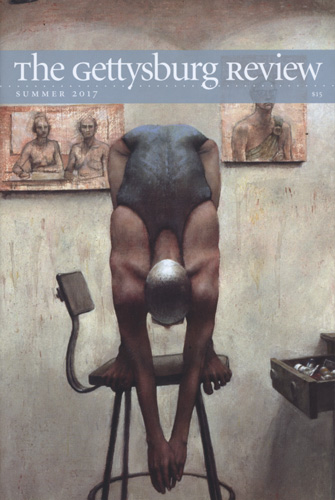The Gettysburg Review – Summer 2017
A mystical melancholy permeates the summer issue of The Gettysburg Review. In fiction, nonfiction, and poetry, writers have tapped into the underground spring of emotion and pulled up some of the ambivalent detritus that accompanies life. This is not to say that the themes in the works included in this issue are dismal; there is a life-affirming quality in acknowledging human emotion in literary texts where strength can be summoned in what may seem like weakness but is more resolute and evolutionary.
A mystical melancholy permeates the summer issue of The Gettysburg Review. In fiction, nonfiction, and poetry, writers have tapped into the underground spring of emotion and pulled up some of the ambivalent detritus that accompanies life. This is not to say that the themes in the works included in this issue are dismal; there is a life-affirming quality in acknowledging human emotion in literary texts where strength can be summoned in what may seem like weakness but is more resolute and evolutionary.
According to Robert Frost, “A poem begins as a lump in the throat, a sense of wrong, a homesickness, a lovesickness.” This seems true of the poems included in this issue, and a few especially seem to emanate from a deep well of longing and sadness. Christopher Howell’s two poems, “End” and “For Gerald, A Letter,” resound with memories of friendship and love through elegiac language that evokes sentiment without being sentimental. There is a catch in the voice in the lines:
I guess we’re both
just making this up because of the loss
of things that are still inside us, simmering
and later:
I guess our souls are just becoming light
and moth-like under the lamp
The tone of the letter transcends the reality of loss in a way that heals the speaker as he moves through emotions. Coming from a different angle, Tony Hoagland’s narrator in “You Have the Freedom to Travel” reveals that he has:
drifted wide of the mark,
misjudged the distance
between the boat and the dock,though it is only life, I remind myself.
Taking the narrator out of the metaphor only to find another one available, this time on a train, the poem asks, “what is the heart but a train // that goes into the tunnel / and comes out again on the other side?” The richness of language, metaphor, and imagery combine in a sense of yearning for “another person on the train, as well.” In a different scenario, Adrian Blevins’s, “Poem in Which for the Turn the ‘I’ Impersonates Her Teenage Daughter,” explores another kind of generational longing through the language of the mother in contrast to her daughter. The result is a compelling use of the vernacular in both speakers attempting to communicate in what seems like a fruitless endeavor in translating the language of one generation to the next. The daughter’s criticism ends with:
I love you Mom, but I am what’s unknowable, and if you don’t know that by
now, what do you know, I want to know.
The sound of futility rises from the page in an inevitable feeling of pointlessness that echoes the first line. Each of these poets has mined their particular part of the earth for truth in human relationships and has delivered a bountiful and fulfilling quarry readers can carry away.
Mining the depths of human behavior and emotion is a metaphor worth extending to the fiction in this issue of the review, and there are stories assuredly on the not-to-be-missed list. “Strange Weather,” by Jenn Gibbs, opens with “Bees happened to Maria when she started to think life had run out of surprises.” What follows is a story of beginnings and endings along a life path connected to a natural order. Maria ponders, “How little humans have ever understood these animals, this world we think ours.” This short story is urgent and eternal in its themes. David Crouse’s “Angel of the Resurrection” comes with urgency too, but from the perspective of disconnectedness and a resistance to a passionless existence. The narrator is a young woman searching for a love connection without success, and the pervading mood is one of acceptance and resignation. The narrator’s sense of being watched and under scrutiny additionally pervades the story as, “The angel kept entering into a remote part of her brain.” This motif helps to carry the plot and govern the character’s actions, and the limited third person point of view is used effectively throughout.
Perspective and connection play thematic roles throughout the pieces in this summer issue of The Gettysburg Review. From Lynda Sexson’s nonfictional treatise on the six-word memoir and flash fiction’s place in literature to Tina Newberry’s six haunting “Paintings,” the issue contains much for readers of contemporary writing who reap satisfaction from such carefully-crafted work that searches for the fulfillment of life’s varied offerings.
[www.gettysburgreview.com]





